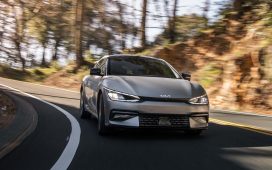Europe is becoming a key battleground for the marketing of electric vehicles (EVs) as the European Commission prepares to bring down what has been called a “blockbuster” report on whether Chinese subsidies are unfairly undercutting their European rivals.

Trade and tariffs were one of the main topics in the discussions between Chinese president Xi Jinping and European Commission president Ursula von der Leyen in Paris on Monday.
Following the meeting, Macron said there had been some advances on the issue of whether China would impose retaliatory tariffs on French cognac.
Von der Leyen struck a belligerent tone on the key issue of EVs. She repeated the claim that China’s “surplus production” was calling market distortions.
“We will defend our companies, we will defend our economies,” she said.
Marcon’s concerns go well beyond brandy. He struck a similar tone to Von der Leyen in a recent newspaper interview in which he said trade relations with China had to be framed with regard to France’s economic security.
There needed to be an “update” because China had “excess capacity in many areas and exports massively to Europe.”
He was not proposing that France distance itself from China but “we must better protect our national security, our sovereignty … and be much more realistic in defending our national interests.”
The same issues are being raised in the US as the Biden administration is developing further anti-China measures on a range of high-tech products. These include EVs and “smart cars” on the basis that they are a threat to “national security”—underscoring the link between economic and military warfare.
There is no question the Chinese state provides support for what it regards as key sectors of manufacturing.
This is in line with the push by Xi to develop the “new productive forces” regarded as central to the next stage of China’s economic development. This is under conditions where the old “model” based on massive real estate and infrastructure projects has run into major problems, not least the growth of debt.
China’s policy, however, is not out of line with what is taking place in the rest of the world. One of the largest state subsidy schemes is the Biden administration’s Inflation Reduction Act which provides major handouts and tax breaks to corporations investing in green technology and has been denounced by the EU as protectionist.
The EU Commission report, which was initiated last September, will release its findings in a few weeks with prediction that it will call for tariffs on Chinese imports ranging between 15 and 30 percent.
Such is the greater technological development carried out by Chinese companies and their more efficient production methods that the price of their EVs will still come in lower than those of their European counterparts if tariffs are set at that level.
According to analysis by the Rhodium Group, an independent research organisation, the results of which were reported in the Financial Times, it would take a tariff as high as 50 percent to make the European market unattractive for Chinese EV exporters.
Examining the position of BYD, one of the major Chinese EV manufacturers, it found that even with a 30 percent tariff, Chinese exports to Europe would still remain “highly attractive.” Chinese production is rapidly expanding and is expected to reach 6.6 million EVs by 2026, up from 2.9 million at the end of last year.
A report on BYD published in the FT last month indicated the driving forces behind its rise to prominence.
State subsidies play a role in China as they have in every technological development around the world as the historical record shows.
One need only recall the role of the state-funded military industrial complex in the US in computer technology and many other areas, or the role of state funding in Japan’s economic rise.
Subsides play a role, but the rise of BYD and other Chinese firms is primarily driven by major technological advances and more efficient production methods. It already rivals Tesla as the world’s largest EV manufacturer, functioning as a vertically integrated structure. In China, which is the world’s largest auto market, BYD’s lower cost pure-battery and plug-in hybrids comprise one-third of all EV vehicles sold.
Last year the company had revenue equivalent to $83.2 billion, a five-fold increase from 2018.
According to the FT report, the company has stakes in six lithium mines across three countries assuring access to the metal vital to produce its batteries. It develops its own computer chips and software programs. Broader social forces also work in its favour.
“The company is able to recruit from the millions of graduates in science, technology, engineering and mathematics (Stem) who pour out of China each year—China had 3.6mn Stem graduates in 2020, compared with 820,000 in the US, according to Georgetown University data,” it said.
It employs close to 100,000 people in research and development based at 11 different locations in China and “on average, its researchers apply for 19 new patents every working day.”
Chinese companies enjoy a significant cost advantage in the building of new factories for the manufacture of batteries. The cost in China is $50-60 million per gigawatt hour compared to $100 million elsewhere.
In 2022 BYD made a major breakthrough when it developed new technology which fused together the battery cell with the body of the vehicle, applicable not only to cars but buses, trucks and other commercial vehicles, reducing costs and weight while increasing rigidity and improving crash safety.
There is another factor at work which was alluded to in comments from Tim Buckley of the Australia-based think tank Climate Energy Finance cited in the FT report.
“They are strategically far sighted,” he said of Chinese firms. “They don’t have the myopic short-termism of Western capitalism.”
This is a reference to the parasitism endemic in major corporations, especially in the US, where shareholder value, often elevated by the investment of profits into share buybacks, has become a key driving force of their operations. This is at the expense of technological development and safety, as the case of Boeing which its series of crashes graphically illustrates.
However, none of this will halt the drive by the US or the EU to impose tariff and other restrictions on Chinese EV producers.
The EU has already had some experience in the economic irrationality of such measures. In 2012 it imposed a tariff regime against imports of Chinese solar panels but then had to lift the controls because it could not find enough suppliers in Europe.
Notwithstanding this history, it will not be repeated because a new dynamic is now at work in the global economy.
What dominates is no longer the doctrine of the free market and taking advantage of gains from the international division of labour, according to which if someone else can produce something cheaper, buy it from them rather than produce it. Rather, each national economy is being placed on a war footing.
As Leon Trotsky explained in 1934, as war clouds were gathering, while tariffs and other restrictions were completely irrational from an economic standpoint, they were a “menacing reality as it is a question of concentrating all the economic forces of the nation for the preparation of a new war.”
The World Socialist Web Site is the voice of the working class and the leadership of the international socialist movement. We rely entirely on the support of our readers. Please donate today!








